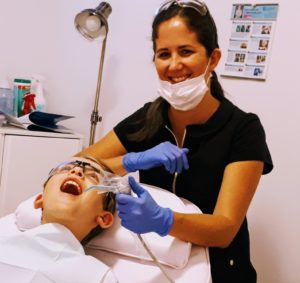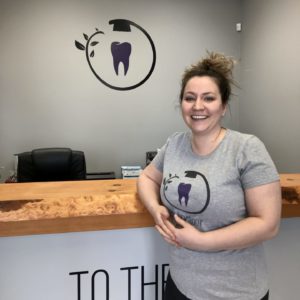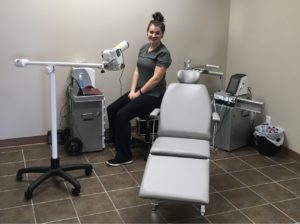
Above: Lakeland area hygienist, Paulette Dahlseide, reviews patient Oscar Lacombe’s chart in his home. — Photo submitted.
Receiving dental care isn’t what it used to be. In fact, a growing number of rural Albertans are now able to access a number of dental services closer to home.
As a result of changes to the Health Professionals Act in 2006, some independent dental hygienists are travelling to their patients rather than the other way around, because they are now able to offer treatment without a supervising dentist.
Some dental hygienists have since set up their own clinics, while others visit clients in designated spaces at seniors’ facilities, schools, Indigenous community centres, and even in private homes.
Independent registered dental hygienists can offer the same services as they would provide in a traditional dental office. Some offer both in-clinic appointments and mobile services, and others provide strictly mobile services.
Meggie Kreutziger opened To The Root in Grande Prairie in 2018. In addition to providing dental hygiene services in her office, she also provides these services to seniors in Pioneer Lodge in Hythe, 60 km west of Grande Prairie.
“I set up a mobile business to fill a need,” she explains. “It started when my elderly dad became unwell. I was never able to get him to a dental hygienist to clean his teeth prior to his passing. This was hard on me as a health-care provider.
“Elderly, senior, geriatric patients are a group that benefit the most. They depend on family or friends to get them places. If they don’t have anyone, they get missed. I chose to fill a gap in health-care/dental hygiene.”

For mobile appointments, Kreutziger sets up her equipment and meets clients in a designated space. She may provide care at their bedside or attend to patients in wheelchairs. Kreutziger notes that mobile dental hygienists are also helpful for Indigenous communities, people with mobility challenges, and home-bound individuals.
Alexandria Yardley opened Peace Country Mobile Dental Hygiene as both a storefront and mobile practice in High Prairie in 2018.
“I was working in a traditional dental office and we would get frequent calls about patients unable to come in due to travel or health issues,” she says.

Yardley services the Pleasantview Lodge and J.B. Wood Continuing Care Centre and travels as far as Little Buffalo and the Sucker Creek First Nation.
She says stringent processes are followed to ensure the same health and safety standards as regular dental offices.
“People enjoy that I can come to them and provide the same service they would normally receive in a traditional dental office.”
One of Yardley’s clients, Lindsie Fairfield chose Yardley to provide her dental services when she set up her mobile business.
“When I first saw Alexandria’s set up, I was both surprised and impressed that she was able carry all the essential equipment necessary for a dental hygiene appointment.”
House calls have become the norm for independent hygienist, Mélanie Letentre-Workman, through her mobile business.
As owner of Go Mobile Dental Hygiene, she’s hit the road to many rural communities in the region, including Bragg Creek, Strathmore, and Three Hills.
She caters to dementia and Alzheimer’s patients, and offers service in French, a growing market.
“I also see many busy families with multiple kids for whom sitting at the dental office twice a year is not likely to happen with their schedules – hockey families like mine,” says Letentre-Workman.
By bringing the clinic to the patient, many barriers can be overcome. The atmosphere of a dental hygiene clinic, whether mobile or storefront, is often perceived as less daunting and more relaxed. There’s no sound of drills and when set up in a school environment, children are put at ease and often can’t wait for ‘their turn’ just like their other classmates. –Paulette Dahlseide
Paulette Dahlseide opened Providence Dental Hygiene ten years ago to serve the Lakeland region. Within this region, she provides services at health centres and schools in the Frog Lake and Cold Lake First Nations, the Fishing Lake and Elizabeth Métis settlements, as well as at long-term care/assisted living facilities in Cold Lake and Bonnyville.
According to Dahlseide, the traditional service model provides barriers for some patients due to transportation and mobility limitations, fear, financial and socio-economic factors, and cultural safety concerns.
“By bringing the clinic to the patient, many barriers can be overcome,” she explains. “The atmosphere of a dental hygiene clinic, whether mobile or storefront, is often perceived as less daunting and more relaxed. There’s no sound of drills and when set up in a school environment, children are put at ease and often can’t wait for ‘their turn’ just like their other classmates.”
“Independent dental hygiene practice, mobile and storefront, are the unmined gems of oral health-care delivery options,” says Dahlseide.
— David Olinger
Did you enjoy this article?
Subscribe to the Rural Health Beat to get a positive article about rural health delivered to your inbox each week.
Oops! We could not locate your form.
